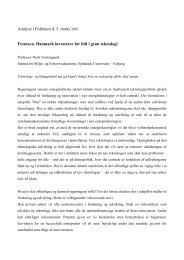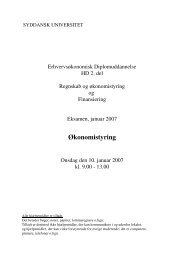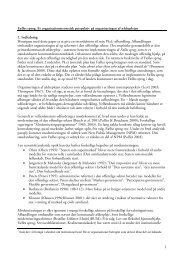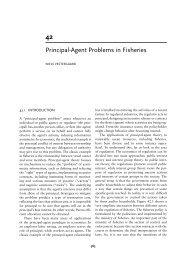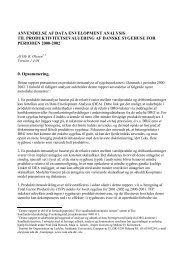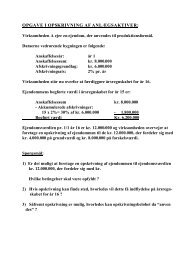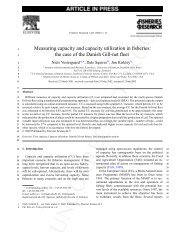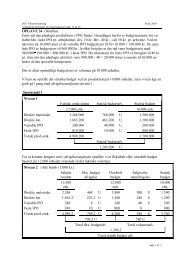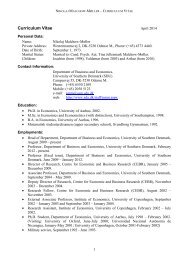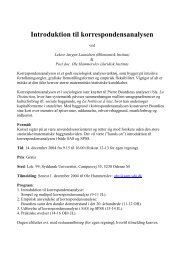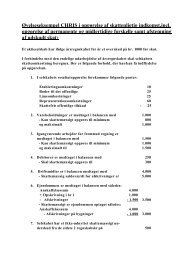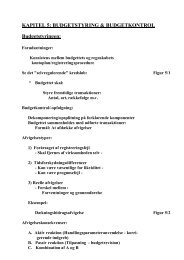complex project for transition under high <strong>in</strong>security. After some time the leadership became moretransactional, but still the political decisions were taken without any close contact to the voters <strong>and</strong>party members. As far as the CEEC’s are concerned “agency <strong>of</strong> leadership” <strong>and</strong> “political craft<strong>in</strong>g”played an important role <strong>in</strong> the first stage <strong>of</strong> post-communism. Opposite, <strong>in</strong>stitutional structures aremore important mov<strong>in</strong>g to more “settled times” <strong>and</strong> more “ord<strong>in</strong>ary politics” (Innes, 2001:112).It is difficult to say, which <strong>of</strong> the above mentioned elite groups that became w<strong>in</strong>ners <strong>and</strong> loosers <strong>in</strong>the new post-communist system. So much can be said that the old, but at the same time modern part<strong>of</strong> the nomenklatura all together has done well. The former communists belong to the fourth group<strong>in</strong> Ágh’s classification <strong>and</strong> the first group <strong>in</strong> Bozóki’s. Before 1989 many former communists hadga<strong>in</strong>ed a considerable political experience, <strong>and</strong> after 1989 they were brought <strong>in</strong> the defensive. The“moral politicians” lost <strong>in</strong>fluence after the political come-back <strong>of</strong> the post-communists, but somecame back after the political pendulum aga<strong>in</strong>s moved to the right. However, moral politicians <strong>and</strong>nationalistic m<strong>in</strong>ded <strong>in</strong>tellectuals had to give way to pragmatists. The new pragmatists <strong>and</strong> postcommunisttechnocrats were recruited from the second rank, i.e. outside the old nomenklatura, butalso outside the dissident circles. Only rarely the former dissidents belonged to the transitionw<strong>in</strong>ners.Some have regretted, others with satisfation observed the “moralisers’” loss <strong>of</strong> <strong>in</strong>fluence <strong>in</strong> politics.In all the countries <strong>in</strong>volved <strong>in</strong>tellectuals have played an important, an even “mythical” role, asregards the Czech Republic people like Palacký, Jungmann, Masaryk <strong>and</strong> Havel. On the conferenceheld <strong>in</strong> Budapest <strong>in</strong> 1996 on “Intellectuals between moral <strong>and</strong> politics”, the mayor <strong>of</strong> Budapest, theliberal Gabór Demszky said, that <strong>in</strong> Hungary several former dissidents <strong>and</strong> nationalistic m<strong>in</strong>ded<strong>in</strong>tellectuals had left politics, for the new Hungary was no longer <strong>in</strong> need <strong>of</strong> “educators” <strong>and</strong>“parents”. Adam Michnik shared that view <strong>and</strong> criticised former dissidents for not be<strong>in</strong>g able toadapt themselves to the new times 24 . “Our heroes fighted for freedom, but they did not learn to loveit”.The peaceful “revolutions” were governed by releatively small counter elites <strong>and</strong> <strong>in</strong>tellectuals. LikeBalcerowicz <strong>in</strong> Pol<strong>and</strong> <strong>and</strong> Klaus <strong>in</strong> the Czech Republic some had been economists <strong>and</strong> technocrats.In Slovakia under Meciar <strong>and</strong> Bulgaria under socialist rule clientelistic structures played asignificant role, b<strong>in</strong>d<strong>in</strong>g together the economic <strong>and</strong> political spehere. Thus, two th<strong>in</strong>gs the new noncommunistleaders had <strong>in</strong> common: the possession <strong>of</strong> political power <strong>and</strong> a extensively lack <strong>of</strong>political experience <strong>and</strong> pr<strong>of</strong>essionalism. In the words <strong>of</strong> Edmund Wnuk-Lip<strong>in</strong>ski, the new leaderswere the alert <strong>of</strong> “elite conspiracy” that might threaten the new won political power, that be fromrepresentatives <strong>of</strong> the old system or people <strong>in</strong>side their own political camp 25 . The first generationnon-communist leaders were mostly ideocratically united, <strong>and</strong> personal networks <strong>and</strong> new-oldcoalitions played a big role. As said, people like Vaclav Klaus <strong>and</strong> Leszek Balcerowicz were ableon own h<strong>and</strong> to leave their stamps on the polical agenda <strong>and</strong> the policy, <strong>in</strong> other words to act like“political entrepreneurs”.Before 1989 many among the new leaders many had been dissidents <strong>and</strong> been long away from “reallife”. They had not been elected democratically, but “appo<strong>in</strong>ted” due to the extraord<strong>in</strong>ary situation,<strong>and</strong> because <strong>of</strong> that they obta<strong>in</strong>ed a considerable political support from the West. The room <strong>of</strong>24 Demszkys <strong>and</strong> Michniks views are mentioned <strong>in</strong> Tismaneanu <strong>in</strong> Antohi <strong>and</strong> Tismaneanu, 1999:153-154.25 Gerd Meyer (Tüb<strong>in</strong>gen), “Towards a Political Sociology <strong>of</strong> Postcommunism: The political Cultures <strong>of</strong> East CentralEurope on the Way to Democracy”, <strong>in</strong>: Andrzej W. Jablonski, Gerd Meyer (eds), 19996:22-25. The subject is alsomentioned by Edmund Wnuk-Lip<strong>in</strong>ski <strong>in</strong> an <strong>in</strong>terwiew <strong>in</strong> the weekly Wprost 7 February 1999 (“Dol<strong>in</strong>a Lez”):19-20.34
maneuvre was great due to political capital. However, the common enemy <strong>and</strong> personal networksplayed a much greater role than common ideologies <strong>and</strong> political programmes. The politicaldisagreeements <strong>and</strong> “wars <strong>in</strong> the top” gave rise to serious legitimacy problems. Evidence showedthat <strong>in</strong> the new post-communist system a dissident background did not necessarily constitute apolitical ressource. Nevertheless, some dissidents, Havel, Göncz <strong>and</strong> (<strong>in</strong> the first stage) Walesa,became popular presidents. In several countries, the presidents ga<strong>in</strong>ed greater popular support thanprime m<strong>in</strong>isters <strong>and</strong> party leaders. In case <strong>of</strong> Hungary <strong>and</strong> the Czech Republic the presidents aimedto move “above politics”.As the transformations moved to more ord<strong>in</strong>ary politics, the political elites should be more<strong>in</strong>clusive, <strong>and</strong> the negative sume game be replaced by a positive sum game, for to move <strong>in</strong> thatdirection better education <strong>and</strong> a neutral <strong>and</strong> well educated bureaucracy were badly needed. Thepower vacuum just after 1989 gave top bureaucrats <strong>and</strong> economists <strong>and</strong> f<strong>in</strong>ancial experts aconsiderable <strong>in</strong>fluence. Most crucial was to enhance the social <strong>and</strong> political dialogue <strong>and</strong> weakenthe position <strong>of</strong> the new-old clientura by <strong>in</strong>stall<strong>in</strong>g younger, neutral <strong>and</strong> better educated people <strong>in</strong> themost important jobs.The reformm<strong>in</strong>ded part <strong>of</strong> the nomenklatura had good opportunities to “twist oneself” <strong>in</strong> the newchaotic system. Some moved to other political parties, even right-w<strong>in</strong>g parties, others aimed toconvert political power to economic power. This strategy <strong>of</strong> survival was especially important <strong>in</strong>case <strong>of</strong> privatisations.Political radicalisation <strong>and</strong> extrication had been an admission card to the new post-communist elite(Marshalek (ed.), 1992:78), but from the mid 1990’s the first elite generation revolutionary had togive place for the second generation liberal m<strong>in</strong>ded reformers. In other words, the first generation<strong>of</strong> “elite break through” was replaced by the second generation post-transitional “elite <strong>of</strong>consolidation” (Frentzel-Zagórgska, i Wasilewski (ed), 2001:11). A more pr<strong>of</strong>essional politicalclass emerged. Many from the second generation elite were well educated hav<strong>in</strong>g constitued “lowernoble class” under the late communism. As noted by Ákos Róna-Tas those people had made apolitical career also <strong>in</strong> case the old state socialist systems had not collapsed 26 . These people wereambitious <strong>and</strong> <strong>in</strong> most cases able to adapt themselves to new <strong>and</strong> fast chang<strong>in</strong>g postcommunistsystem.The polical learn<strong>in</strong>g proces became more pa<strong>in</strong>ful than first extpected. Some problems had to dowith difficulties when mov<strong>in</strong>g from work<strong>in</strong>g “underground” to work “above the surface”, i.e.legally. With political freedom new coalition <strong>and</strong> networks emerged between the political parties<strong>and</strong> the new cultural <strong>and</strong> economic elites, <strong>in</strong>clud<strong>in</strong>g technocrats. Under those new circumstances thecivil societies played an unobtrusive role. A great part <strong>of</strong> the efforts was aimed at promot<strong>in</strong>g thesufficiently high loyalty <strong>and</strong> cohesion on the elite level <strong>and</strong> demobilise the civil societies <strong>and</strong>mak<strong>in</strong>g it responsible <strong>and</strong> accountable.For simple reasons the the political leaders were not elected democratically. In stead they were“appo<strong>in</strong>ted”, i.e. accepted by most people because <strong>of</strong> the underground work <strong>and</strong> the widespreadsupport from the West. Some became charismatic leaders, e.g. Lech Walesa <strong>and</strong> Václav Havel, butafter some time a depersonalisation (Havel) or erosion <strong>of</strong> charisma (Walesa, Meciar) set <strong>in</strong>. Thefreedom <strong>of</strong> maneuvre for the new elites was to a great extent due to the big political capital, the26 Ákos Róna-Tas, “Path Dependence <strong>and</strong> Capital Theory: Sociology <strong>of</strong> the Post-Communist Transition”, EastEuropean politics <strong>and</strong> Societies, Vol. 12, No. 1, W<strong>in</strong>ther 1998:113.35
- Page 3: “This provisional situation chara
- Page 6 and 7: marketisation and privatisationshor
- Page 8 and 9: purposes, are channels for “expre
- Page 10 and 11: the significance of strategic choic
- Page 12 and 13: presidentialism gave rise to “flo
- Page 14 and 15: antipolitics and reinforcement of a
- Page 16 and 17: In the late 1990’s elections most
- Page 18 and 19: determined primarily by “politica
- Page 20 and 21: politics and antipolitics, all sign
- Page 22 and 23: which attitudes to state regulation
- Page 24 and 25: Anti-communism has been defined in
- Page 26 and 27: elections and the Slovak communists
- Page 28 and 29: Cartel agreementsbetter representat
- Page 30 and 31: Basically the absence of clear cons
- Page 32 and 33: After 1989 different types of polit
- Page 36 and 37: window of opportunity in spite of s
- Page 38 and 39: analyses of party institutionalizat
- Page 40 and 41: political messages and slogans. Thu
- Page 42 and 43: well established party culture may
- Page 44 and 45: expected, much due to the many spli
- Page 46 and 47: Furthermore, the polarisation on el
- Page 48 and 49: Finally, Solidarity can also be con
- Page 50 and 51: whole, on the one side an authorita
- Page 52 and 53: The economic recession and the grav
- Page 54 and 55: election defeat more cooperation an
- Page 56 and 57: The formation of AWS can be conside
- Page 58 and 59: group. RS AWS constituted the Chris
- Page 60 and 61: According to the original plans the
- Page 62 and 63: values. According to Rybicki, as so
- Page 64 and 65: AWS should fight against all types
- Page 66 and 67: 2001 parliamentary election, howeve
- Page 68 and 69: and workers voted ZChN. At the 1993
- Page 70 and 71: The League has been considered as a
- Page 72 and 73: establishment like than LPR’s. Th
- Page 74 and 75: jobs in rural areas, especially sma
- Page 76 and 77: industrial policy. According to the
- Page 78 and 79: pressurizing the government to give
- Page 80 and 81: democrats, thereby locating itself
- Page 82 and 83: To conclude, the Freedom Union (UW)
- Page 84 and 85:
Polish middle class. Thus, in Janua
- Page 86 and 87:
such as KSCM and KSS in The Czech R
- Page 88 and 89:
The SLD leaders were mainly recruit
- Page 90 and 91:
the falling popular support for pri
- Page 92 and 93:
innovation was formation of the pol
- Page 94 and 95:
place after talks with each applica
- Page 96 and 97:
Has the Left any freedom of manoeuv
- Page 98 and 99:
medicine, changes in the labour cod
- Page 100 and 101:
The Labour Union (UP), Democratic U
- Page 102:
Nevertheless, before that had taken



